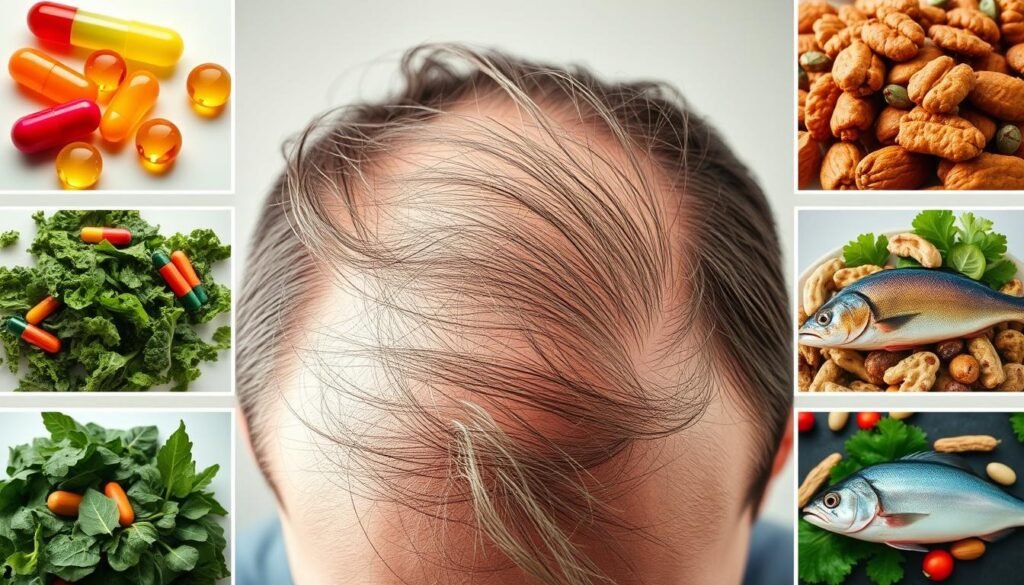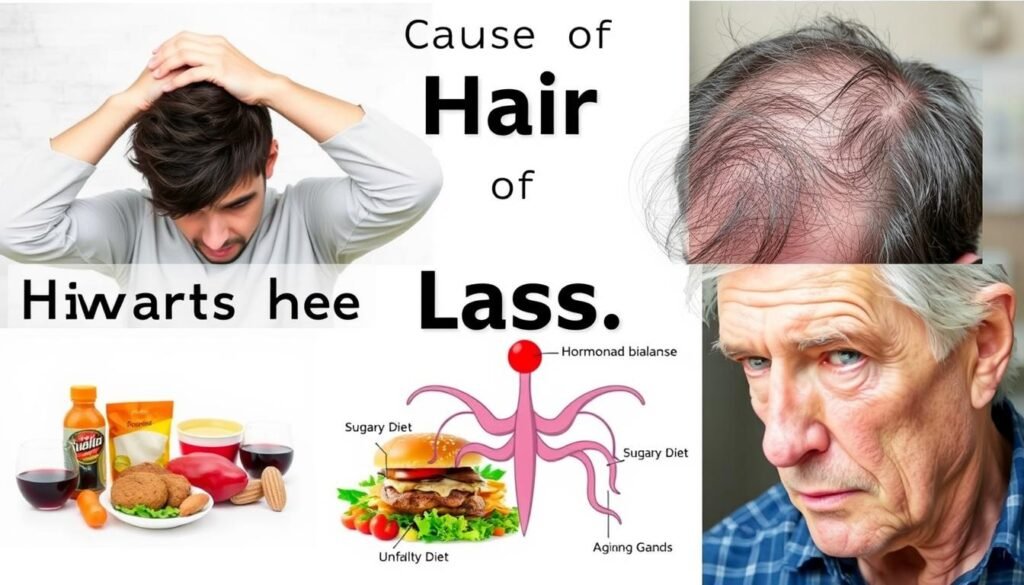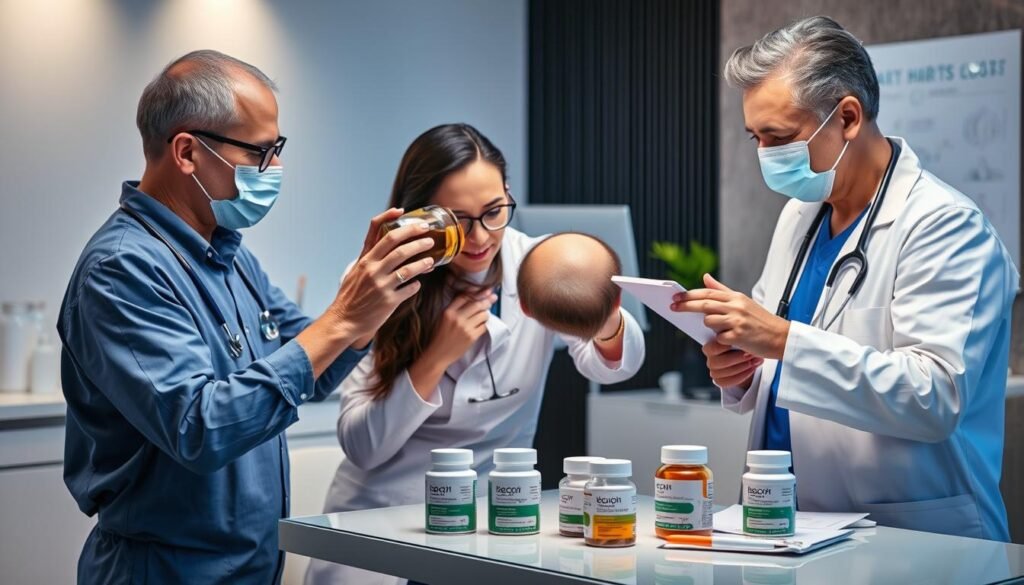Did you know an average person’s scalp has between 100,000 to 200,000 hair follicles? Every day, you could lose up to 100 strands of hair. It’s vital to know which vitamins help with hair loss, especially for those wanting to keep their hair healthy. Hair loss is a big issue. It impacts nearly 80% of men and around 50% of women sometime in their life. With everyone looking for ways to prevent hair loss, vitamins are key. They help hair grow and keep it healthy. This article will highlight the top vitamins for battling hair loss, offering valuable advice for those concerned about their hair.
Key Takeaways
- The average person has 100,000 to 200,000 hair follicles.
- Daily hair loss can amount to up to 100 strands.
- Nearly 80% of men and 50% of women experience hair loss during their lifetime.
- Vitamins play a critical role in hair growth and overall hair health.
- Understanding vitamin deficiencies can help in addressing hair loss.
Understanding Hair Loss
Hair loss, known as alopecia, affects people of all ages, genders, and backgrounds. Knowing the main causes of hair loss is key to treatment and management. It can be caused by genetics, hormonal changes, poor nutrition, and stress.
Understanding the hair growth cycle helps in grasping hair loss better. The cycle has three parts: anagen (growth), catagen (transition), and telogen (rest). During the anagen phase, lasting 2 to 8 years, about 90% of hair grows. The catagen phase takes 2 to 3 weeks, then comes the telogen phase, which is 2 to 3 months long. Normally, losing 50 to 100 hairs a day is normal. Yet, losing more can signal a problem.
There are different types of hair loss. Androgenetic alopecia affects both men and women. Alopecia areata can cause complete hair loss in areas. Conditions like involutional alopecia cause hair to thin over time with age. Stress and hormonal changes, from events like childbirth or treatment, can worsen hair loss by disrupting its cycle.
To wrap up, knowing how hair loss ties to the hair growth cycle is vital. It helps in pinpointing why hair loss occurs. With this knowledge, people can find the right approach to deal with their hair loss issues.
The Role of Vitamins in Hair Health
Getting the right vitamins for hair loss is key to keeping your hair healthy. Studies show that people with thinning hair or alopecia often have lower vitamin D and B12 levels. This suggests a strong connection between vitamin deficiency and hair loss.
Vitamins are crucial for hair strength and growth. They help make proteins like keratin, which is important for hair. Some improve blood flow to the scalp, feeding hair roots. Vitamins also fight oxidative stress, a cause of hair loss.
By changing our diet or taking supplements, we can tackle these vitamin shortages. This can really help reduce hair loss.
Clinical studies have shown that adding essential vitamins can make hair thicker and reduce hair fall. Lack of vitamin D and iron is especially common in women with hair loss. What we eat affects our vitamin levels, so eating right or taking supplements matters.
To wrap up, vitamins are very important for hair health. They play a big role in preventing and dealing with hair loss. Knowing about vitamins for hair loss and vitamin deficiency and hair loss can make a big difference.
What Vitamin Helps Hair Loss
Knowing which vitamins help with hair growth is key to stopping hair loss. Biotin and vitamin D are very important for having healthy hair. They help with hair growth and keeping hair healthy, helping those losing their hair.
Biotin: The Most Popular Choice
Biotin, or vitamin B7, is often seen as key for hair. It helps make keratin, making hair strong and tough. If you don’t have enough biotin, your hair might start to thin, although this is not common. Adults usually need 30 mcg of biotin daily. But, those treating hair loss might take up to 5,000 mcg to help hair grow.
Vitamin D and Its Impact on Hair Growth
Vitamin D is important for hair follicle health, but we’re still learning how. Not having enough vitamin D is linked to losing hair, especially where there’s less sun. Experts suggest getting 2,000-5,000 IU of vitamin D daily, through food or supplements. It’s a vital step for dealing with hair loss.
Vitamin Deficiencies Related to Hair Loss
Understanding how vitamin deficiencies affect hair health is key. Keeping vitamins at the right level prevents hair loss. Iron and vitamin E are very important for keeping hair healthy.
Iron Deficiency and Hair Thinning
Iron deficiency is widespread, mainly among women who menstruate. It can cause a condition known as telogen effluvium, which means more hair shedding. Signs of this issue include dizziness, tiredness, and pale skin. These signs show the need for more iron.
Lacking enough iron affects red blood cell production. This reduction harms how oxygen gets to hair follicles. Good sources of iron are:
- Red meat
- Leafy greens
- Fortified cereals
Vitamin E: An Antioxidant Benefit
Vitamin E is known for fighting oxidative stress, which can cause hair loss. It plays a vital role in keeping the scalp healthy. This supports hair growth. Not having enough vitamin E can make hair dry and may lead to hair loss. Adults should get about 15 mg of vitamin E daily from:
- Nuts
- Seeds
- Vegetable oils
Vitamin E is crucial not just for scalp health but for hair strength too.

| Vitamin | Deficiency Effects on Hair | Recommended Sources |
|---|---|---|
| Iron | Increased shedding, pale skin | Red meat, leafy greens, fortified cereals |
| Vitamin E | Dry hair, potential hair loss | Nuts, seeds, vegetable oils |
Best Vitamins for Hair Loss in Females
Dealing with hair loss in women means knowing key vitamins for hair health. Folic acid and vitamin B12 are crucial. They help in growing and maintaining healthy hair.
Folic Acid: Supporting Hair Follicles
Folic acid, also known as vitamin B9, is vital for making keratin. Keratin gives hair its structure. Not enough folic acid can cause hair to thin and fall out. Women, particularly those who can have children, need 400 mcg of folic acid daily. This supports their hair well. Getting enough folic acid helps fight hair loss. Check out this resource for more info on vital vitamins.
Vitamin B12: Importance in Hair Health
Vitamin B12 is essential for keeping hair healthy. Not having enough B12 can lead to a lot of hair falling out. Women should get 1.5 to 2.4 mcg of it each day. Those who follow strict diets might need B12 supplements. This ensures they have enough for good hair growth. Focusing on these vitamins helps women support their hair better.
| Vitamin | Role in Hair Health | Recommended Daily Intake |
|---|---|---|
| Folic Acid (B9) | Supports keratin production | 400 mcg |
| Vitamin B12 | Prevents hair loss | 1.5 – 2.4 mcg |
Supplements for Hair Loss
The interest in hair loss supplements is on the rise. People are looking for ways to improve their hair health. Products with multiple ingredients are especially popular. They combine nutrients like zinc, saw palmetto, and omega fatty acids. These are known to help with hair density. While many find these products helpful, results can vary a lot from person to person.
Multi-ingredient Formulas
Multi-ingredient supplements are designed to tackle various nutrient shortages that harm hair health. Zinc is linked to reducing a type of hair loss known as telogen effluvium. About half of those who took 50 mg of zinc daily saw their hair loss decrease. However, the Food and Drug Administration doesn’t monitor these products like prescription drugs. This fact makes it crucial to choose supplements that are what they claim to be.
Natural Remedies and Extracts
There are natural remedies for hair health besides supplements. For example, taking collagen might increase hair thickness, a study suggested. It found that 2.5 g of collagen each day could increase hair follicles and thickness. Omega-3 fatty acids might also make hair thicker and reduce loss. Always talk to healthcare providers before starting any supplement to understand the potential risks and benefits.
Natural remedies and supplements can help with hair health, but too much can be harmful. If you already have balanced nutrient levels, supplements might not help much. Seeing improvements in hair growth can take months. This is because genetics, diet, and the reason for hair loss affect the outcome too.
Hair Loss Vitamins for Men
Men losing hair can find help with certain vitamins. They often lack iron, biotin, zinc, vitamin D, vitamin E, and folate. Fixing these shortages is key for good hair growth and less hair falling out.
Effective vitamins for men’s hair health include biotin. Biotin is important for making keratin, which hair needs to be strong. Men with male pattern baldness usually have less biotin. Taking extra biotin can help. Also, vitamin D is vital, especially in older men. It plays a big role in how hair grows.
Zinc helps hair follicles recover and is linked to treating male pattern baldness. Vitamin E also helps hair grow, even if you’re not lacking it. But don’t take too much vitamin E, as it could cause more hair loss. About 15 mg daily is enough.
Adding omega-3, 6, and 9 fatty acids is smart, too. They’re good for hair thickness in everyone. Supplements with these fatty acids can be part of treating hair loss. Saw palmetto is useful as well. It stops testosterone from changing into DHT, a hormone that can cause hair loss in some people.
Eating well and taking the right vitamins can be a solid plan for dealing with hair loss. Getting more nutrients helps fight hair loss and supports healthy hair.
| Nutrient | Role in Hair Health | Recommended Daily Intake | Notes |
|---|---|---|---|
| Biotin | Supports keratin production | 30 mcg | Deficiency linked to hair loss |
| Vitamin D | Regulates hair follicle cycling | 600 IU | Common deficiency in older men |
| Zinc | Helps recover hair follicles | 11 mg | Low levels correlate with hair loss |
| Vitamin E | Promotes hair growth | 15 mg | Over-supplementation can cause loss |
| Omega Fatty Acids | Increases hair density | Refer to product guidelines | Supports overall hair health |
Common Causes of Hair Loss
Understanding why hair loss happens is key to tackling it. Various factors can erode confidence and affect well-being.
Genetics is a big reason for hair loss, appearing as androgenic alopecia in both genders. Men may see a receding hairline or bald spots. Women might notice their hair thinning or part widening. Aging also reduces hair density.
Hormonal shifts, like those from PCOS, often lead to women’s hair thinning. Not getting enough iron, protein, biotin, or vitamin D can also cause hair to fall out. This is especially true for people with autoimmune issues.

Sometimes, sudden weight changes affect hair growth. Quick weight loss can lead to nutrient shortages and hair loss. Scalp infections, causing itching and bald spots, can be treated. Also, compulsively pulling out hair can cause temporary hair loss.
Certain medicines and treatments like chemotherapy and radiation lead to hair loss. Thankfully, hair often grows back after these treatments. Constantly wearing tight hairstyles can harm your hair, just as scarring conditions can permanently damage follicles.
Many health conditions could trigger hair loss. Thyroid issues can thin hair, and unchecked STDs might cause patchy hair loss. Exposing your hair to toxins like arsenic or too many vitamins can also be harmful.
Knowing these causes helps people find the right treatment. Talking to a doctor can shed light on personal situations and help fight hair loss.
| Cause of Hair Loss | Description |
|---|---|
| Genetic Predisposition | Hereditary factors leading to androgenic alopecia in men and women. |
| Hormonal Changes | Conditions like PCOS causing thinning hair in women. |
| Nutritional Deficiencies | Lack of iron, protein, and biotin linked to visible hair loss. |
| Scalp Infections | Can lead to redness, itching, and patches but are treatable. |
| Medications | Some treatments may lead to temporary hair loss during use. |
| Stress and Lifestyle | Weight fluctuations and tight hairstyles contributing to hair loss. |
| Environmental Factors | Toxic exposure to chemicals that negatively affect hair growth. |
Dietary Considerations for Hair Health
A balanced diet is key to having healthy hair. Eating foods full of essential vitamins can greatly improve your hair’s growth and health. It’s important to know which foods can boost your hair’s vitality.
Foods Rich in Essential Vitamins
Some foods are very good for your hair. These include:
- Leafy greens: Spinach and kale are packed with vitamins A and C. These vitamins help make sebum, a natural oil that moisturizes hair.
- Eggs: They are full of biotin, which is great for stronger hair and growth.
- Fatty fish: Salmon and mackerel have lots of omega-3 fatty acids and vitamin D. These are key for healthy hair.
- Nuts and seeds: Almonds, walnuts, and flaxseeds are good sources of vitamin E. This vitamin fights off oxidative stress that can harm hair follicles.
- Fruits: Berries have plenty of vitamin C. This vitamin is needed for making collagen, important for hair structure.
Focusing on these foods can create a rich nutrient environment for your hair. This might lead to better hair conditioning and overall health.
Consulting with Healthcare Professionals
People with hair loss should talk to healthcare experts. These professionals are key in checking your overall health and finding vitamin shortages. They recommend the right treatments and changes in diet to improve hair health.
Talking to experts is critical. They understand why hair loss happens. For instance, not having enough biotin can lead to thinning hair. This means checking your diet and maybe adding supplements. Also, a lack of iron, which is common in women, can hurt your hair. A proper check-up helps find the best solution for you.
- Assessment of vitamin deficiencies
- Recommendations for dietary changes
- Guidance on supplements for hair growth
- Identification of underlying health conditions
Experts also teach about supplement safety, as using them without guidance is risky. They watch how these supplements work. This ensures you get the nutrients needed for good hair growth. Partnering with them leads to better hair health.

Conclusion
Taking the right vitamins and eating well can greatly improve hair. Vitamins like biotin, Vitamin D, folic acid, and B12 help a lot. Even though not many lack biotin, those who do might see hair loss or weak nails. Some think about taking biotin supplements, but results aren’t the same for everyone.
Vitamin D is key, especially for people not in the sun much. Not having enough can lead to hair issues or even alopecia. It’s important to keep an eye on how much you get.
Lacking iron is a big reason for hair loss, especially in women. Eating iron-rich foods or taking supplements can make a difference. Missing out on Vitamin B12 affects hair too, mainly for those who don’t eat meat. To learn more, you can read about great vitamins for hair and how they fight hair loss.
Talking to doctors can help figure out what your body needs. Fixing these shortages can lead to better hair growth. Professionals often see good results once these issues are tackled. The aim is to get strong, healthy hair.